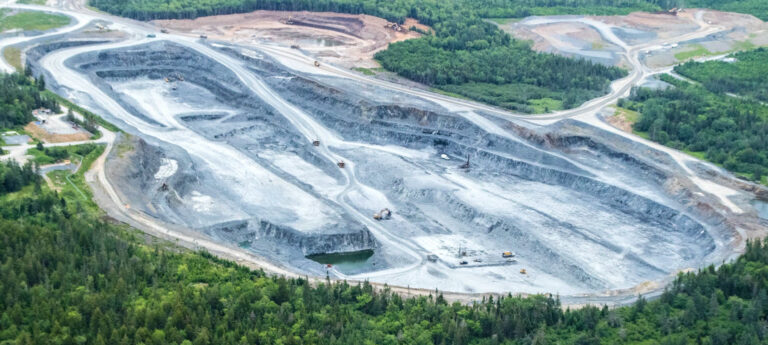Photo: Touquoy Mine tailings impoundment (aka “Tailings Management Facility”), Moose River, NS; courtesy of Raymond Plourde
For immediate release: May 10, 2022
The Atlantic Chapter of Sierra Club Canada Foundation is calling on the Nova Scotia government to ban gold mining in the province, in advance of the anticipated Environmental Assessment approval for the Touquoy gold mining site “modifications” requested by Atlantic Mining NS Inc., better known as Atlantic Gold. The Minister of Environment and Climate Change, Tim Halman, is expected to give his decision on or before Thursday, May 12.
If approved, these modifications will pave the way for Atlantic Gold to increase toxic tailings pollution and greenhouse gas emissions; disrupt more local communities with trucks hauling ore, chemicals, and other supplies on public roads; contaminate local groundwater, rivers, and streams; damage already fragile ecosystems, including vulnerable forests, and harm endangered species and other wildlife.
In exchange for using Nova Scotia as its personal “string of pearls,” Atlantic Gold will employ a few hundred local people. The company paid no corporate taxes to the provincial or federal governments in 2017, 2018, 2019, or 2020—no data is available yet for 2021. Thanks to a fuel-tax rebate program for the province’s mining industry, Atlantic Gold pays no taxes on its fuel purchases, either.
“There really is no justification for gold mining in this day and age,” says Tynette Deveaux, with the Atlantic Chapter. “Gold is not on Canada’s list of critical minerals. Most of the gold being mined today is used for jewelry production. The environmental cost of a new gold ring is simply too big a price to pay.”
For every ounce of gold that Atlantic Gold produces, it extracts 70 tonnes of ore and rock waste and produces vast amounts of toxic tailings. Gold mining is also energy-intensive and results in staggering greenhouse gas emissions. In fact, carbon emissions from Atlantic Gold’s 2020 gold production at the Touquoy mine was equivalent to taking 106,663 return flights between New York and Paris.
“Our federal and provincial governments are paying lip service to the climate emergency,” says Deveaux. “There’s no place for gold mining in a credible action plan to reduce greenhouse gas emissions.”
Natural Resources and Renewables Minister, Tory Rushton, has assured Sierra Club Canada that mining companies must “adhere to strict environmental regulations.” But when the penalty for contravening the law is a financial slap on the wrist rather than jail time, it seems that companies such as Atlantic Gold are willing to take their chances.
In February, a Nova Scotia court fined Atlantic Gold $250,000 for failing to comply with federal and provincial environmental regulations. The federal prosecutor in the case pointed to the company’s “reckless disregard” for the regulations. In the provincial court, Judge Murphy stated in her ruling that the company’s violations were more likely intentional than accidental.
The Touquoy site modifications are intended for one reason only: to expand Atlantic Gold’s mining activity on the province’s Eastern Shore (Beaver Dam, Fifteen Mile Stream, and Cochrane Hill).
“Concerned citizens have been working tirelessly for years to stop gold mining expansion on the Eastern Shore,” says Lindsay Lee, who is a member of the Atlantic Chapter’s Executive Committee. “But the government continues to rubber-stamp damaging resource projects in the province, in spite of community opposition, disastrous environmental effects, and plain old common sense. When are we finally going to get an environmental assessment process that works for Nova Scotians instead of against them?”
It’s time for the province to ban gold mining altogether and finally get going on creating jobs that support clean renewable energy, environmental stewardship, and climate adaptation and resilience. Workers shouldn’t have to choose between doing a job that destroys the local environment and putting food on the table.
—30—
For information or interviews, contact:
Tynette Deveaux, Beyond Coal Campaign
Sierra Club Canada, Atlantic Chapter
tynetted@sierraclub.ca
Lindsay Lee, Executive Committee Member
Sierra Club Canada, Atlantic Chapter
lindsaymckim@gmail.com
NS Mining Fact Sheet — Sierra Club Canada Foundation
If approved, the Touquoy Gold Mine Site “Modifications” will
- expand the mine’s footprint by 18 hectares (the size of 44 football fields);
- allow Atlantic Gold to use the exhausted open pit at the Touquoy mine to store toxic tailings from the proposed Beaver Dam, Fifteen Mile Stream, and Cochrane Hill gold mines;
- allow the company to transport millions of tonnes of ore to the Touquoy mine, where Atlantic Gold will process it with cyanide, caustic soda, and hydrogen peroxide to extract the gold; it also paves the way for the company to legally allow some of the tailings from this process to leach into the local groundwater once the mine is closed;1
- allow the company to use and degrade public roads as it transports millions of tonnes of ore from the proposed mines to Touquoy. According to the company, for the Beaver Dam project alone, “The number of return truck trips per day will be an annual average of approximately 95 trucks, 350 days per year for the anticipated duration of the Project (5 years),”2 and estimated shifts of “16-hour day (7 a.m. to 11 p.m.).”3
- result in a massive influx in CO2 emissions from operating diesel trucks, excavators, and generators. In its Environmental Impact Statement Summary for the proposed Fifteen Mile Stream project, the company says it anticipates using 6 million litres of diesel per year for haul trucks and equipment.4
- taxpayers will continue to fork over millions of dollars to pay for repairs to public roads used by the company’s haul trucks to transport ore.5 Local residents will also have to put up with ongoing noise, arsenic-laden dust,6 and traffic safety hazards posed by thousands of return trips by haul trucks;
- violate Indigenous rights; see communications by Millbrook First Nation Chief Robert Gloade.7
Footnotes:
- Fifteen Mile Stream Gold Project 2021 Environmental Impact Statement Summary p. 96: “The numerical modelling shows 85% of TMF seepage will be collected via gravity drain however the 15% will be allowed to enter the groundwater flow system (i.e., bypass the collections system) and will discharge to East Lake and/or Watercourse 12 (tributary to Seloam Brook) north of the TMF.”
- Beaver Dam Mine Project 2021 Environmental Impact Statement Summary, October 2021, Atlantic Mining, page 18 of the PDF
- Beaver Dam Mine Project 2021 Environmental Impact Statement Summary, October 2021, Atlantic Mining, page 36 of the PDF
- Fifteen Mile Stream Gold Project Environmental Impact Statement Summary, February 2021, Atlantic Mining, page 35 of the PDF
- Who benefits from Atlantic Gold’s Nova Scotia operations? By Joan Baxter, June 21, 2021
- Expansion of gold mining on the Eastern Shore meeting with stiff resistance. By Joan Baxter, November 26, 2021
- Proposed open-pit mine in Nova Scotia threatens traditional hunting grounds says Mi’kmaw chief, Angel Moore, APTN News, January 2022; also this letter by Chief Robert Gloade




